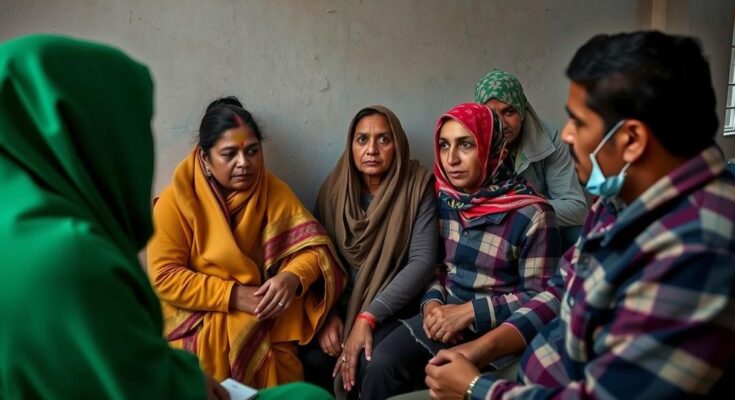Bangladeshi evacuees recount harrowing experiences fleeing Israeli airstrikes in Lebanon. Amid widespread destruction, they share fears for their families and lost belongings. Many migrants are now sheltered in Saida, facing challenges due to a lack of documentation and the complexities of repatriation. The Lebanese Health Ministry reports over 2,600 casualties from Israeli attacks, reinforcing the urgency of their plight.
DHAKA: Morium Begum, a Bangladeshi mother of two, recently fled Israeli airstrikes in Lebanon, uncertain if she would reunite with her family. While working as a housekeeper in Nabatieh, a city targeted by Israeli bombardments late in September, she described experiencing “huge explosions everywhere and continuous bombing around me.” The escalating violence forced her to seek refuge in Saida, approximately 30 kilometers away, where the Bangladeshi embassy and local NGOs are currently sheltering around 300 Bangladeshi migrant workers. Begum was one of approximately 120 Bangladeshi nationals evacuated from Lebanon recently. After 14 years of working abroad, she returned home empty-handed, having left all her belongings behind. “The situation was very, very dangerous. I didn’t even get the chance to bring any clothes with me,” she expressed. Despite her loss, she remained thankful to Allah for her safe return. As reported by the Lebanese Health Ministry, the death toll from the current conflict exceeds 2,600, with over 12,200 injured due to attacks targeting civilian and medical infrastructure since early October. Another Bangladeshi migrant, Shila Khatun, also sought refuge in Saida and shared that the house she worked in has been destroyed. “I would have been dead if I stayed there for two or three days more,” she stated. However, despite her escape to Saida, safety was not assured; she recalled that on her first day at the shelter, a bomb struck just 100 meters away. “It was like hell on earth,” Khatun remarked, struggling for words to describe the horror of her situation. Estimates indicate that between 70,000 and 100,000 Bangladeshi nationals reside in Lebanon, many without official documentation. The Ministry of Foreign Affairs has indicated that the repatriation process is complicated by airport closures and the absence of proper documentation for migrants. Mohammad Uzzal, another evacuee who worked in a local restaurant, expressed his gratitude for the assistance of his employer, who located him after he sought safety in Saida. He noted, “Many of us — Bangladeshi, Lebanese, and other nationals — rushed to a safer location.” Uzzal arrived at the shelter without money or his passport, which was returned to him later by his employer. He emphasized the relief he felt upon receiving his wages and reported that he felt fortunate to have survived the ordeal. Reflecting on the experience, Uzzal stated, “I have two small children. Every moment, I prayed to Allah to grant me a few days more on this earth to look after my children. To me, this is like a second life.”
The ongoing conflict in Lebanon, particularly the recent escalation involving Israeli airstrikes, has created a perilous environment for many residents, including migrant workers. The situation has resulted in significant casualties and widespread destruction, prompting many foreign nationals, particularly those from Bangladesh, to evacuate in search of safety. The displaced individuals often face challenges, such as inadequate documentation and disruption of normal escape routes, complicating their efforts to return to their home countries. The plight of Bangladeshi migrants, who form a considerable portion of the foreign workforce in Lebanon, highlights the broader humanitarian crisis created by ongoing hostilities in the region.
The harrowing experiences of Bangladeshi migrants, such as Morium Begum, Shila Khatun, and Mohammad Uzzal, illustrate the dire consequences of the recent Israeli attacks on Lebanon. Despite the tragic loss of their homes and possessions, their accounts reflect a profound sense of relief at having survived and been able to return. The situation underscores the urgent need for international attention and support for those displaced by conflict, as well as a sustainable resolution to the ongoing violence.
Original Source: www.arabnews.com




